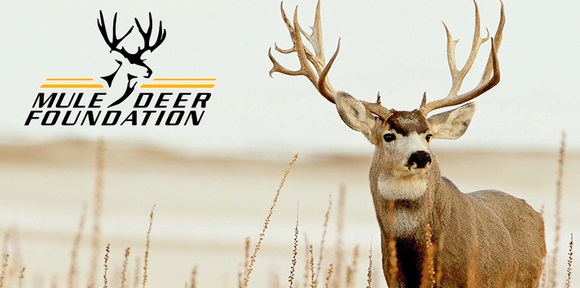
The Mule Deer Foundation announced today that it had received a grant from the National Fish and Wildlife Foundation to increase the organization’s capacity to work with state agency partners and the federal government on big game migration corridors and winter range projects. The 2-year grant will support MDF’s focused efforts to help implement corridor conservation and restoration projects focused in Colorado, Wyoming, and Montana. With this funding, MDF will launch a Migration Initiative to serve a key role in meeting the goals of the Department of the Interior Secretarial Order 3362.
“We appreciate the support of the National Fish and Wildlife Foundation so the Mule Deer Foundation can increase our capacity to help the successful implementation of projects in important migration corridors and winter ranges that will benefit mule deer and many other species,” commented MDF President/CEO Miles Moretti. “Since Secretarial Order 3362 was signed at our annual Western Hunting & Conservation Expo last February, MDF has been actively engaged in working with our state and federal partners to support big game migration conservation. With this grant, MDF will be able to move forward with our Migration Initiative and play a leadership role in implementing projects that will make a tangible difference on the ground.”
With the new funding, MDF will be hiring a coordinator to manage the organization’s efforts for corridor and winter range conservation efforts. The added capacity will ensure an MDF staff person will be dedicated to identifying and coordinating potential project opportunities as well as working with partners to ensure federal and state policy is aligned with the purpose of SO 3362.
In a separate grant program from MDF’s capacity funding, the National Fish and Wildlife Foundation announced in November a multi-million dollar grant program dedicated to corridor conservation. The Mule Deer Foundation’s “Talking Mule Deer” podcast episode released today is an interview with NFWF grant administrator Seth Gallagher who describes this habitat conservation grant program and how the MDF capacity grant dovetails with this much larger effort.
Talking Mule Deer Podcast Episode 19 – National Fish & Wildlife Foundation, Big Game Corridors Grant Program
On this episode of Talking Mule Deer, Jodi and Steve talk with Seth Gallagher, manager of Rocky Mountain regional programs for the National Fish and Wildlife Foundation (NFWF). We learn about what NFWF is, how the organization receives funding, and how it has provided billions of dollars for conservation across the country. We talk about some of the private land conservation efforts that NFWF has been engaged in, including sagebrush conservation that benefits mule deer, and how important this is to help keep agriculture viable and conserve important fish and wildlife habitat. We then hear about NFWF’s new grant initiative offering $2.7 million for on-the-ground habitat conservation efforts needed to help implement Secretarial Order 3362 on big game migration corridors. Projects support specific needs identified by state fish and wildlife agency plans that were developed in response to the Order. Some of the efforts could include work on transportation projects to help wildlife crossings, easements to conserve corridor bottlenecks or stopover sites, fire restoration, and more. The funding for the new NFWF grant program came through the Bureau of Land Management, the U.S. Fish and Wildlife Service, and Conoco-Phillips. More information about the grant program, including a link to the request for proposals, and the state plans can be found at www.nfwf.org/westernmigrations. The grant deadline is in early January with plans to announce grants in March in order to get these habitat conservation and restoration projects on the ground by next summer. We also talk about a capacity grant that the Mule Deer Foundation just received from NFWF to implement an initiative within the organization for these types of boots-on-the-ground projects to benefit mule deer.
